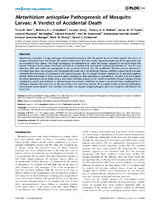Metarhizium anisopliae Pathogenesis of Mosquito Larvae: A Verdict of Accidental Death

Ver/
Autor
Butt, Tariq M.
Greenfield, Bethany P.J.
Greig, Carolyn
Maffeis, Thierry G.G.
Taylor, James W.D.
Piasecka, Justina
Dudley, Ed
Abdulla, Ahmed
Dubovskiy, Ivan M.
Garrido-Jurado, Inmaculada
Quesada-Moraga, Enrique
Penny, Mark W.
Eastwood, Daniel C.
Editor
Public Libray of Science (PLOS)Fecha
2013Materia
Metarhizium anisopliaeDengue
Yellow fever
METS:
Mostrar el registro METSPREMIS:
Mostrar el registro PREMISMetadatos
Mostrar el registro completo del ítemResumen
Metarhizium anisopliae, a fungal pathogen of terrestrial arthropods, kills the aquatic larvae of Aedes aegypti, the vector of
dengue and yellow fever. The fungus kills without adhering to the host cuticle. Ingested conidia also fail to germinate and
are expelled in fecal pellets. This study investigates the mechanism by which this fungus adapted to terrestrial hosts kills
aquatic mosquito larvae. Genes associated with the M. anisopliae early pathogenic response (proteinases Pr1 and Pr2, and
adhesins, Mad1 and Mad2) are upregulated in the presence of larvae, but the established infection process observed in
terrestrial hosts does not progress and insecticidal destruxins were not detected. Protease inhibitors reduce larval mortality
indicating the importance of proteases in the host interaction. The Ae. aegypti immune response to M. anisopliae appears
limited, whilst the oxidative stress response gene encoding for thiol peroxidase is upregulated. Cecropin and Hsp70 genes
are downregulated as larval death occurs, and insect mortality appears to be linked to autolysis through caspase activity
regulated by Hsp70 and inhibited, in infected larvae, by protease inhibitors. Evidence is presented that a traditional hostpathogen
response does not occur as the species have not evolved to interact. M. anisopliae retains pre-formed pathogenic
determinants which mediate host mortality, but unlike true aquatic fungal pathogens, does not recognise and colonise the
larval host
